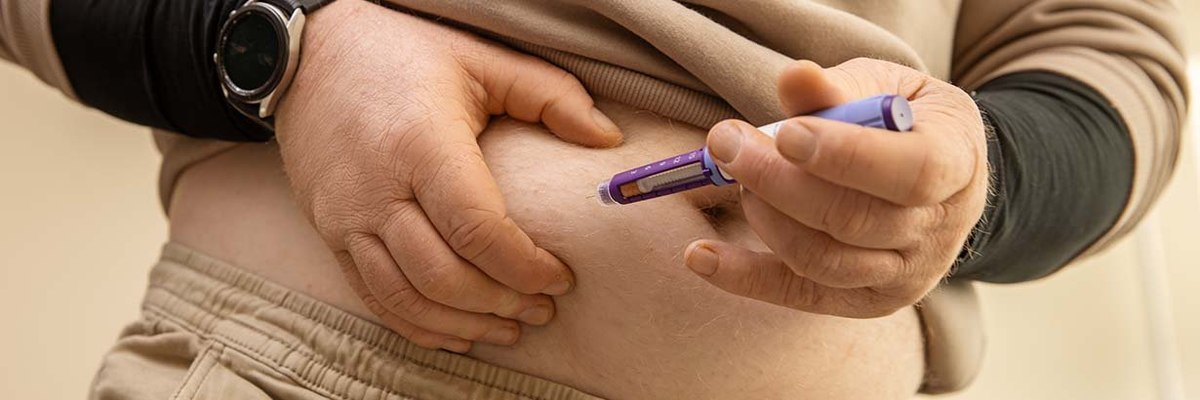While 64% of Britons currently trying to lose weight believe weight loss jabs are acceptable, just 35% would be willing to use them or have done so already
Attempting to lose weight is something many have battled with, but it’s a battle that might be getting easier, thanks to new weight loss jabs like Ozempic, Mounjaro and Wegovy. Trials and increasingly real-world evidence show they can lead to substantial weight loss, but there’s also a stigma around them, with some feeling they are ‘cheating’ or ‘lazy’. So how do Britons, including those trying to lose weight, feel about these jabs?
At present, using weight loss jabs is a rarity. Just 7% of those currently trying to lose weight, and 4% of all Britons, have used them to help shed the pounds. But there is clear growth potential for the products, with a further 28% of those trying to lose weight saying they would be very or fairly willing to take them in future.
This does, though, show a significant degree of reluctance around them, with 60% of those attempting to lose weight saying they would not be willing to use them, including 42% who say they would not at all be tempted to do so.
This may be because most Britons appear to see weight loss jabs as a less ‘legitimate’ way of losing weight. When comparing jabs to the traditional method of diet and exercise, 71% of Britons say that it is better for somebody to lose weight the old-fashioned way.
Just 20% of the public believe that neither method is inherently better than the other.
Indeed, a minority appear to be outright hostile to weight loss jabs. A quarter of Britons (25%) say that using such jabs to lose weight is “unacceptable”, including 21% of those currently trying to lose weight.
Nevertheless, this does mean a majority of Britons (56%) feel the use of weight loss jabs is acceptable, rising to 64% among those attempting to lose weight.
Why do some Britons say it’s unacceptable to use weight loss jabs?
Given the noted stigma against weight loss jabs in some circles, we asked the quarter of the British public who feel it is unacceptable to use such injections why they feel that way, with the results then categorised with the help of YouGov AI tools.
A preference for ‘traditional’ or ‘natural’ methods of weight loss, such as diet and exercise, is given by 25% of those who feel jabs are unacceptable, while 22% are concerned about potential or as yet unknown side effects. One in six (18%) feel more certain of the side effects and say that weight loss jabs are unacceptable because they believe they are dangerous.
One in eight (12%) are outright critical of the users of jabs, believing them to be an “easy quick fix” that is “lazy”, with a handful of respondents even saying it is “cheating”. One in ten (10%) are worried that such jabs would be ultimately ineffective without changing underlying habits, with 7% relatedly seeing them as a short-term fix that would just end up with weight regain unless kept up forever.
The cost of the jabs to the NHS is a key reason for 7% of those who see weight loss jabs as unacceptable, with another 8% concerned that their use for weight loss disrupts the supply for diabetics (for whom Ozempic was originally developed to help manage blood sugar levels).
How many Britons are trying to lose weight?
If they can overcome the varying degrees of reluctance many Britons currently express, the potential market for weight loss jabs is substantial.
Overall, nearly half of Britons (45%) say they are currently trying to lose weight, while a further fifth (20%) have done so in the past and 9% say they intend to do so in future. Just one in five Britons (21%) say they have never tried to lose weight and don’t intend to do so.
Women are more likely to be watching their weight, with half (52%) currently trying to shed the pounds, though this is also true of four in ten men (38%). Roughly a fifth of both genders (18-22%) have tried to lose weight in the past, with roughly the same proportion of men and women (8-10%) looking to do it at some point in the future.
What has Britons’ experience of traditional weight loss techniques been?
With such a small fraction of those trying to lose weight having used weight loss jabs, how have the rest tried to shed to pounds?
Dieting in some form is the most common technique, with 93% of those who have tried to lose weight saying they have attempted switching to healthier foods, including 70% who reported that this had a positive effect. A similar 92% of dieters say they have tried eating less food overall, including 67% saying this paid dividends.
Nearly nine in ten of those who have attempted to lose weight (87%) say they increased the amount of exercise they do, including 63% saying this had a clear positive effect on their weight.
Two thirds of those trying to lose weight (65%) have tried increasing their water consumption, though just 35% report doing this to success. A fifth (21%) have used dietary supplements, though just 7% have used it to positive effect.
Would you be willing to take weight loss injections? What do you think about losing weight in general, and everything else? Have your say, join the YouGov panel, and get paid to share your thoughts. Sign up here.
Photo: Getty










